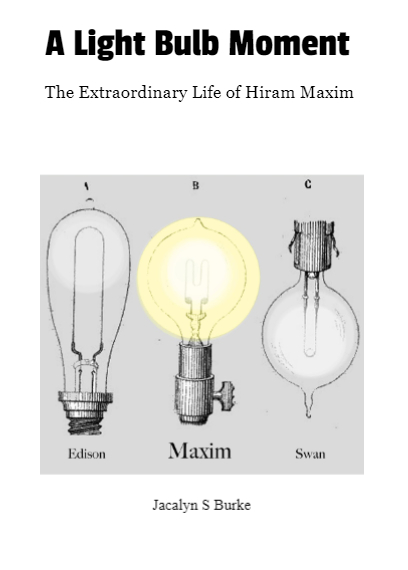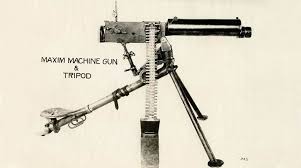
“Sir Hiram Stevens Maxim, who lived from 1840 to 1916, is rarely mentioned in the same breath with Thomas A. Edison, Alexander Graham Bell, the Wright brothers, and the other great American inventors of his day. However, in the book, The Social History of the Machine Gun, historian John Ellis points out, ”Without Hiram Maxim, much of subsequent world history might have been different.”-“1
This book aims to address that omission.
Overview
Three things that marked out the 20th century: the circuit breaker, the electric lightbulb, and the machine gun lead directly back to one man: Hiram Stevens Maxim. His life ran from poverty to riches, from American citizen to British subject, from unknown commoner to world-famous inventor.
His awards and titles were numerous and included a knighthood by King Edward VII and a Chevalier of the Legion of Honour from the French government both of which convey the breadth of his professional achievements. He was a personal friend of the Emperor of China, and his network across Europe was aristocratic.
A Light Bulb Moment is full of controversy. Why did Maxim leave the electric light race to Edison despite his commercial successes in that field? Why did he abandon his young family? How did a common foreigner with zero connections gain entry into elite circles of influence? And what about those darker secrets: bigamy, taboo sexual tastes and an accusation of murder?
Worthy of a Dan Brown plot, Maxim the man was entangled in a web of conspiracy from the moment he set foot on Manhattan. The cabal that utilized his talents had a hidden agenda, one that would lead to the killing fields of First World War 1.
A Light Bulb Moment plunges into three pivotal periods of Sir Hiram Stevens Maxim’s life: his early adulthood in the out-back frontier towns of Maine, his New York years as a young inventor of electrical systems, and his later years in London as a knighted gentleman.
Excerpts from the book.
Excerpt 1: “A Light Bulb Moment (chapter)
“Edison’s electric light did not come from the continuous improvement of candles.”
Oren Harari
Maxim sat looking up at the new moon from a small window, in the darkness of his attic room. Its crescent of silvery light being only strong enough to dust the chimney tops with a dab of gray. In the distance a line of yellow gas lights flickered near the Gowanus Bay docks. Great open furnaces belched up sparks blasting the night blood red. But it was never enough.
For thousands of years humans had battled a formidable force, Maxim pondered. It snuck away at daybreak but returned at dusk with a renewed hunger. All year round it waged a war on thinking minds and held them captive to the ravages of nature. Night.“
Excerpt 2: “The idea that Thomas Edison offered Hiram Maxim freelance employment in the early days might not be so wild. It could make sense of Sawyer and Maxim’s tangled tussles where Edison ultimately proved the winner. It also explains how Maxim suddenly progressed, seemingly over a matter of months, from being middle-management in a steam company to a highly paid electrician in a well-funded Manhattan Company. Doors were certainly opened to him at this point in his career. Was it also a coincidence that exactly around this time Maxim and Sawyer became close friends?
For sure, Sawyer and Maxim would have easily run into one another a hundred different ways. Both men were outsiders from Maine and sociable, flirty types. Sawyer was a big boozer and womanizer. Maxim liked a drink too. Sawyer also had a big mouth. It wouldn’t take Maxim long to casually bump into him.
It was probably a random encounter one night at some dockside tavern on the East River in what is now referred to as Seaport. In Maxim’s day this riverfront was a workingman’s domain. The only women around were serving girls, fishmongers or hookers. The air was a pungent cocktail of rotting fish, sour beer and roasting sweet corn. It was a noisy and filthy rat-infested labyrinth of narrow back streets but it hosted some of the best taverns and oyster houses in Manhattan.
Did it begin at the bar? Perhaps Sawyer overheard Maxim’s accent and once commonalities were discovered they took up a conversation over porter and oysters? They could have talked about jockeying patents and the well-heeled but greedy moneymen with noses in the trough. We can surmise that the cocky Sawyer likely under-estimated Maxim and pegged him as a humble mechanic, as was intended and an invitation to a workshop for some intellectual tinkering was offered at the end of a mammoth drinking session. This would have been an optimum move on Maxim’s part.
He was an astute people-watcher. For every pint that he drank Sawyer could have downed three. Then there were the whisky and gin chasers, followed by impromptu card games. Sawyer’s casual way of flashing stacks of notes didn’t go unnoticed by Maxim either. The guy was a bandy-legged, pot-bellied rabble-rouser. His ego matched his drinking prowess. Sawyer’s key flaw however, was his non-stop bragging. Every tall-tale was embellished into hyperbole but within each sound bite hid valuable information…”
Excerpt 3:
“The Girl in the Trolley Car (chapter)
– “Did you meet your husband on the Bowery, as he charges?” – “I did. It was in 1878. I was then a girl of fifteen.” – Helen Leighton 1
It was a cold New York morning in early January 1878 and Maxim was out running errands near Chatham Square. Perhaps he was dropping off some patent papers or picking up a mechanical part from a workshop. Everyone was dashing about trying to avoid a ferocious East River wind. It was the usual clamor of horses and wagons. Chatham Square was, after all, close to the bustling Bowery. 2
Maxim spied a crowded, horse-drawn trolley car approaching and to save himself a couple of block’s walk in the freezing air he casually climbed aboard.
If you had been onboard the car you would have noticed the tall, broad-shouldered man almost immediately. He had magnetic black eyes and thick tousled hair. You would have been aware of someone who was mulling over a thousand hidden ideas. But like most men once he had climbed aboard, Maxim temporarily stopped thinking. He took a good hard look at all of the females in his view. There were lots of them. Which one was a local Bowery girl? Open to suggestion and a quick shilling’s worth of fun?
And then, it happened. Maxim came upon a vision of such loveliness that he temporarily lost his mind. At the very front of the car stood Helen Leighton. “
Narrative non-fiction. A full proposal is available upon request.



